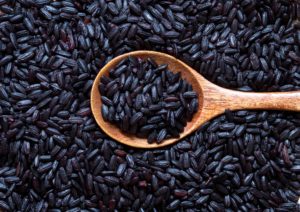
Rice isn’t just red, white, or brown. Black rice exists too. Long called the “forbidden rice” or “emperor’s rice,” it’s a much less common form of rice that’s growing in popularity. Its nicknames come from a long history, and word has it that it was initially only served to dignitaries and leaders in the Far East to encourage health and longevity.
These days, however, black rice is available to all. You can find it in most grocery stores and restaurant dishes across the country. It costs a little more than other varieties, but that’s because it’s a bit harder to produce; black rice crops only yield about 10% of what different rice varieties can.
Research suggests that black rice originated about 10,000 years ago when a specific gene went “haywire.” It occurred as a natural genetic mutation that farmers have been controlling ever since. Its nutrient makeup, like it’s color, make black rice very unique.
Its one nutrient in particular that gives black rice its power: anthocyanins. Anthocyanins are the same antioxidants that give blueberries, blackberries, acai berries, and eggplant their deep dark hues. Black rice even has more anthocyanins than blueberries, which are widely regarded as one of the healthiest foods you can eat. Compared to whole grain brown rice, black rice is also high in vitamin E and is an excellent source of fiber to promote digestion and heart health.
But the anthocyanins are what make this grain truly unique. Anthocyanins have the potential to promote heart and brain health by limiting inflammation, lowering cholesterol, and reducing the risk of heart disease and dementia. And, generally speaking, they don’t typically show up in grains!
Next time you head to the grocery store, treat yourself like an emperor: pick up some black rice. It’s a versatile grain, popular in many East-Asian dishes, and can add some new flavors to your routine.